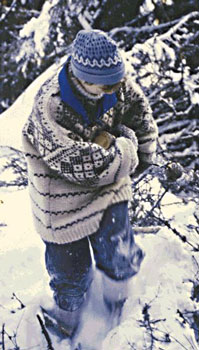When people meet in Lapland, they usually start with a short family history by explaining whose daughters and sons they are. Here are my roots.
 Tennberg is originally a German name, not a Swedish one as many often think. Tennberg is actually a hill in northern Germany, near Ralswiek, close to the Polish border. The “first” Tennberg was a merchant who came to Finland in late 17th century. My father’s family lived near Porvoo in southern Finland. On my mother’s side, the Heikkinens, my roots are in Kainuu, south of Lapland, in a village called Lumikylä, “Snow village”, where my ancestors moved in late 16th century to establish a farm near the Finnish-Swedish-Russian border as the Swedish king had ordered. So I come from a long line of shopkeepers and farmers. However, by identity, I am a southerner, lived my childhood in the city centre of the capital, Helsinki, became educated there, finished first “Norssi I” high school and studied at University of Helsinki political science (international relations), anthropology, environmental studies, and communications. With this background - how did I then end up in Rovaniemi and in Arctic studies?
Tennberg is originally a German name, not a Swedish one as many often think. Tennberg is actually a hill in northern Germany, near Ralswiek, close to the Polish border. The “first” Tennberg was a merchant who came to Finland in late 17th century. My father’s family lived near Porvoo in southern Finland. On my mother’s side, the Heikkinens, my roots are in Kainuu, south of Lapland, in a village called Lumikylä, “Snow village”, where my ancestors moved in late 16th century to establish a farm near the Finnish-Swedish-Russian border as the Swedish king had ordered. So I come from a long line of shopkeepers and farmers. However, by identity, I am a southerner, lived my childhood in the city centre of the capital, Helsinki, became educated there, finished first “Norssi I” high school and studied at University of Helsinki political science (international relations), anthropology, environmental studies, and communications. With this background - how did I then end up in Rovaniemi and in Arctic studies?
At the end of my university studies, in the late 1980s, I worked as a research assistant at the Finnish Institute of International Affairs (FIIA) and my task was to assist in writing a report on Finnish global policies. In the process, I was given a file from ministry of foreign affairs consisting information on Arctic issues. I continued to collect information about this issue and it led to my doctoral dissertation on the establishment of the Arctic Council and how state-indigenous peoples relations where negotiated in the process in late 1990s. While working in the FIIA, an assistant position opened at University of Lapland in international relations. I thought this was an opportunity for me to continue my studies and so I ended in Rovaniemi. I never thought that I would stay here longer, but still I am here, after 20 years. The first ten years I worked in the faculty of social sciences. To me, it seemed quite “natural” to work on Arctic politics being in Rovaniemi which was at the time a center of many Arctic political developments and events.
Nowadays, since 2004, I work as a research professor at the Arctic Centre. The tasks of a research professor are many: to conduct my own research, to lead the work of the research group, publish articles and books, supervise doctoral students, apply funding for research, teach and participate in the development of the institute and to various international collaborative projects. In the last few years, I have focused in my research and with my research team to develop “northern political economy” to study political and economic development in this region characterized by many, connected and contrary changes. However, I feel the word “North” captures better those many spatial dimensions which are taking place and affecting us. Recently I have published articles with colleagues on neoliberalism and sustainable development from local perspectives in the Barents region and political economy of vulnerability to storms. Right now I am finishing an article on political economy perspective to Arctic change for a handbook on Arctic politics.
I live in Rovaniemi with my daughter, a dog and a cat, in “a rowhouse” nearby the hospital. I don’t have much time for hobbies, but I try to find time for swimming and gym. I plan to become an aqua jogger this fall.